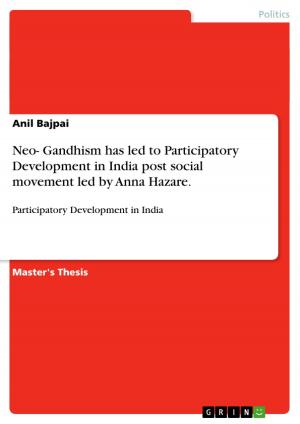Public Policies on Sustainable Logistics and the Impact on Third-Party Logistics Provider
Business & Finance, Management & Leadership, Production & Operations Management| Author: | Martin Töbelmann | ISBN: | 9783656069751 |
| Publisher: | GRIN Verlag | Publication: | December 6, 2011 |
| Imprint: | GRIN Verlag | Language: | English |
| Author: | Martin Töbelmann |
| ISBN: | 9783656069751 |
| Publisher: | GRIN Verlag |
| Publication: | December 6, 2011 |
| Imprint: | GRIN Verlag |
| Language: | English |
Master's Thesis from the year 2011 in the subject Business economics - Supply, Production, Logistics, grade: Distinction / 78%, University of Westminster, course: Logistics and Supply Chain Management, language: English, abstract: The logistics sector is growing rapidly. Freight transport has increased by 31 per cent between 1995 and 2005. As the volume of world trade rises, the European Commission predicts a further 50 per cent increase by 2020. But the logistics sector faces a number of challenges. Besides globalisation, means supply chains have become longer and more complex, increasing traffic congestion and soaring fuel prices, the logistics industry faces public and state environmental concerns, such as air and water pollution, energy con- sumption or waste disposal. Studies show that transportation and logistics can account for up to 75 per cent of a business's carbon footprint. National governments and the European Union have therefore introduced a number of measures to 'green' transport and in order to reduce greenhouse gas emissions. Policy-makers and their policies and regulations on sustainable logistics are assumed to play a critical role in the future development of sustainable logistics. The key research questions are Q1: How do 3PL companies see their current corporate activity in terms of sustainable logistics dependent on governmental policies and regulations? Q2: To what extent do 3PL firms think that governmental policies and regulations are necessary in order to shift the industry towards more sustainability? Q3: How do 3PLs assess the role of subcontractors on this topic and how will the logistics market be influenced by policies on sustainable logistics? The selection of the sampling is based on the exploratory sample which helps to generate deep insights into new ideas and people's expertise. In total, five logistics experts were questioned through telephone and face-to-face semi-structured interviews. All experts work in different leading transport and logistics firms in executive positions.
Master's Thesis from the year 2011 in the subject Business economics - Supply, Production, Logistics, grade: Distinction / 78%, University of Westminster, course: Logistics and Supply Chain Management, language: English, abstract: The logistics sector is growing rapidly. Freight transport has increased by 31 per cent between 1995 and 2005. As the volume of world trade rises, the European Commission predicts a further 50 per cent increase by 2020. But the logistics sector faces a number of challenges. Besides globalisation, means supply chains have become longer and more complex, increasing traffic congestion and soaring fuel prices, the logistics industry faces public and state environmental concerns, such as air and water pollution, energy con- sumption or waste disposal. Studies show that transportation and logistics can account for up to 75 per cent of a business's carbon footprint. National governments and the European Union have therefore introduced a number of measures to 'green' transport and in order to reduce greenhouse gas emissions. Policy-makers and their policies and regulations on sustainable logistics are assumed to play a critical role in the future development of sustainable logistics. The key research questions are Q1: How do 3PL companies see their current corporate activity in terms of sustainable logistics dependent on governmental policies and regulations? Q2: To what extent do 3PL firms think that governmental policies and regulations are necessary in order to shift the industry towards more sustainability? Q3: How do 3PLs assess the role of subcontractors on this topic and how will the logistics market be influenced by policies on sustainable logistics? The selection of the sampling is based on the exploratory sample which helps to generate deep insights into new ideas and people's expertise. In total, five logistics experts were questioned through telephone and face-to-face semi-structured interviews. All experts work in different leading transport and logistics firms in executive positions.















